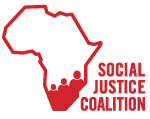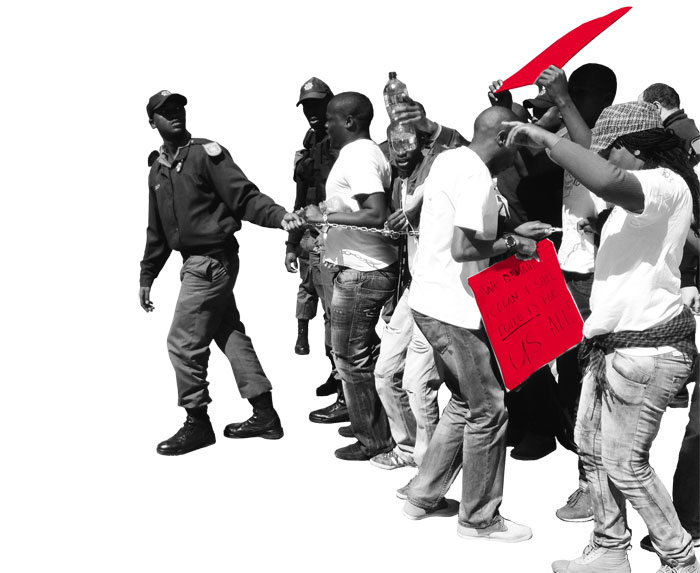21 activists were arrested and charged with contravening the Regulation of Gatherings Act (RGA). In February 2015, the 10 elected leaders who were identified as the convenors of the protest were convicted; the other 11 were acquitted. We expected the convictions. When the trial began we admitted the facts and did not deny that the gathering took place, but argued that the RGA itself is unconstitutional and a remnant of Apartheid.
Leave to appeal was granted in July 2015 in the Cape Town Magistrate’s Court. This meant that a higher court could now determine the constitutionality of the Gatherings Act.
In her judgment Magistrate Fredericks explained that there is a reasonable prospect that a higher court may find elements of the RGA unconstitutional. Our appeal application was lodged at the Western Cape High Court in March 2016 following delays with accessing the court record.
We argue that Section 12(1))(a) of the RGA limits the right to freedom of assembly as guaranteed by the Constitution. It criminalises a gathering of more than 15 people just because no notice was given and this is unconstitutional.
A number of civil society organisations with an interest in upholding the right to protest have expressed interest in being admitted as Amicus Curiae (friends of the court). The ‘SJC 10’ are represented by the Legal Resources Centre. The case was heard in the Western Cape High Court in 2017.
On Wednesday 24 January 2018, in the Western Cape High Court, Judge T.C. Ndita delivered a landmark judgment in the #SJC10 case that has major repercussions on the right to protest in South Africa.
Judge Ndita overturned the convictions of 10 Social Justice Coalition (SJC) activists who had been arrested under the Regulation of Gatherings Act in 2013 during a picket outside the Mayor’s office where they had chained themselves to the railings of the Cape Town Civic Centre in a peaceful and organised act of civil disobedience. This followed more than two years of attempted engagement with the Mayor on the lack of a water and sanitation plan for Cape Town’s informal settlements.
The historic judgment ruled that section 12 (1) (a) of the Gatherings Act is unconstitutional because it limits and criminalises peaceful protest. The ruling does not affect previous convictions under the Gatherings Act, and any future contraventions of the Act will not arrest and a criminal record.
The judgment stated: “The criminalisation of a gathering of more than 15 on the basis that no notice was given violates s 17 of the Constitution as it deters people from exercising their fundamental right to assemble peacefully unarmed…the limitation is not reasonable and justifiable in an open and democratic society, based on the values of freedom, dignity and equality…Section 12 (1) (a) of the RGA is hereby declared unconstitutional”.
The ruling comes five years after the SJC protest demanding a plan for water and sanitation in Cape Town’s informal settlements. In our victory we remember Nolulama Jara, one of the convicted SJC leaders, who tragically passed away in August 2015. She remained on our appeal. We deeply mourn the loss of Nolulama and thank her and her family for all their courage. We honour her memory and contribution to the struggle for freedom and democracy.
The Minister of Police appealed the High Court judgment to the Constitutional Court. We are deeply concerned that the Minister has chosen to support the currently severe limitation on Section 17 of the Constitution, the right to freedom of assembly.
The Constitutional Court heard the SJC10 case on 21 August 2018. On Monday 19 November 2018 the South African Constitutional Court made an historic ruling that declared section 12(1)(a) of the Regulation of Gatherings Act (RGA) unconstitutional.
The unanimous judgment reads, “People who lack political and economic power have only protests as a tool to communicate their legitimate concerns. To take away that tool would undermine the promise in the Constitution’s preamble that South Africa belongs to all who live in it, and not only a powerful elite. It would also frustrate a stanchion of our democracy: public participation. This is all the more pertinent given the increasing rates of protest in constitutional South Africa lately”.
Phumeza Mlungwana, the first accused in the criminal case and former General Secretary of the SJC, said, “The Constitutional Court has again positively shown the working of our democracy. Too often working-class people are left with no option but to protest for the most basic constitutional rights, yet stand a great chance of being criminalised. Today’s judgment is not only about reiterating people’s right to protest, but it’s also about empowering people to organise and fight for their rights”.
Section 12(1)(a) criminalised the failure to give notice for a protest of more than 15 people. This served as a major deterrent to protests, whereby people are less likely to protest due to the possibility of a criminal record – the harshest possible limitation on a right. This is a disproportionate punishment that is in conflict with Section 17 of the Constitution, the right to freedom of assembly. The Constitutional Court declared, “section 12(1)(a) is unconstitutional in its entirety, because, on the case before this Court, the criminalisation of convening gatherings is unconstitutional—regardless of whether the subsequent gathering is violent”.
The Constitutional Court on Monday set aside the SJC 10’s criminal records. The effect of the declaration of constitutional invalidity will apply to all pending criminal trials, and to criminal trials in relation to which review or appeal proceedings have not yet been finalised. This means that anyone being prosecuted (but not yet convicted) cannot be found guilty of violating section 12(1)(a) of the RGA. The Court found that there is no need to amend or replace section 12(1)(a), as it does not leave a legislative vacuum and the remainder of the RGA provides incentives for notice of gatherings. The Court left it up to Parliament to decide on any revisions to the Act, as it is the place of the Legislature to do so.
As noted by the Constitutional Court, “South Africa’s pre-constitutional era was replete with draconian legislation that, in an attempt to preserve the apartheid political order, punished people for assembling when it did not suit the State”. This judgment is undeniably a step forward for the right to protest in South Africa, but we recognise that across the country, ordinary people will still face many other violations to this basic right, whether from municipalities inventing their own rules to declare legitimate protests ‘illegal’, police and prosecutors using phony criminal charges to keep protest leaders trapped in the criminal justice system for months or even years, and far-reaching interdicts that shield corporations, universities and other powerful institutions from protest. Most recently, in the City of Johannesburg, activists have cried foul over the use of ‘protest fees’ that force poor people to pay a fee before the City will ‘allow’ their protest to go ahead.
In welcoming the Constitutional Court’s judgment, we also reaffirm our commitment to the struggle for equality, freedom and justice; a struggle that we must and will continue.

